2028年までのアジア太平洋地域のインスタント食品市場予測 – 新型コロナウイルス感染症の影響と地域分析 – 製品タイプ別(朝食用シリアル、インスタントスープ、インスタントスープ、ヌードル、スナック、焼き菓子、菓子、その他)および流通チャネル (スーパーマーケットおよびハイパーマーケット、コンビニエンスストア、オンライン小売など)
No. of Pages: 147 | Report Code: BMIRE00025689 | Category: Food and Beverages
No. of Pages: 147 | Report Code: BMIRE00025689 | Category: Food and Beverages
アジア太平洋地域のインスタント食品市場 は、2021 年に 3,498 億 9,000 万米ドルから 米ドルに成長すると予想されています2028 年までに 5,483 億超。2021 年から 2028 年までに 6.7% の CAGR で成長すると推定されています。
ここ数十年で、さまざまな国で女性の労働参加が大幅に増加しました。このような女性の雇用の大幅な増加により、労働者階級の間でインスタント食品の人気が高まっています。これらの食品は、簡単に入手、保存、提供、または食べることができるため、時間と体力を節約できて便利です。さらに、働く女性人口の増加により、人々の食生活も変化しています。
アジアでは、女性の労働力参加率は 16% から 16% の範囲です。アフガニスタンはネパールの83%に達し、この地域の他のいくつかの国ではさらに増加しています。この地域の多くの国で女性の労働力は急激に増加しています。参加者の増加はさまざまな時点で始まり、さまざまな速度で進みました。それにもかかわらず、富裕国における女性の労働力参加の実質的かつ持続的な増加は、20世紀の経済的および社会的発展の際立った特徴であり続けました。したがって、この要因は、インスタント食品市場の成長に潜在的に寄与している可能性があります。
新しい機能やテクノロジーにより、ベンダーは新たな顧客を引きつけ、新興市場での拠点を拡大することができます。この要因により、予測期間中にアジア太平洋地域のインスタント食品市場が大幅な CAGR で成長する可能性があります。
アジア太平洋地域のインスタント食品市場セグメンテーション
アジア太平洋地域のインスタント食品市場は、製品の種類、流通チャネル、国に基づいて分割されています。製品タイプに基づいて、市場は朝食用シリアル、インスタントミール、インスタントスープと麺、スナック、焼き菓子、および食品に分類されます。菓子類、その他。 2021 年には、その他のセグメントがより大きな市場シェアを保持し、中食セグメントは予測期間中により高い CAGR を記録すると予想されます。
<スパン>流通チャネルに基づいて、市場はスーパーマーケットとスーパーマーケットに分類されます。ハイパーマーケット、コンビニエンスストア、オンライン小売など。 2021 年には、コンビニエンス ストア部門が最大の市場シェアを保持し、オンライン小売部門は予測期間中に市場で最高の CAGR を記録すると予想されます。
国に基づいて、市場は中国、日本、インド、オーストラリア、韓国、およびその他のアジア太平洋地域に分類されます。 2021 年には、アジア太平洋地域のその他の地域が最大の市場シェアを占め、インドは予測期間中に最も速い CAGR で成長すると予想されます。
<スパン>ネスレSA;コナグラブランズ株式会社;クラフト・ハインツ・カンパニー。ゼネラル・ミルズ社; MTRフーズ社;ホーメルフーズ株式会社; JBS SA;タイソン・フーズ社;とケロッグ カンパニーは、アジア太平洋のインスタント食品市場における数少ない大手企業です。
Strategic insights for Asia Pacific Ready-to-Eat Food involve closely monitoring industry trends, consumer behaviours, and competitor actions to identify opportunities for growth. By leveraging data analytics, businesses can anticipate market shifts and make informed decisions that align with evolving customer needs. Understanding these dynamics helps companies adjust their strategies proactively, enhance customer engagement, and strengthen their competitive edge. Building strong relationships with stakeholders and staying agile in response to changes ensures long-term success in any market.

| Report Attribute | Details |
|---|---|
| Market size in 2021 | US$ 349.89 Billion |
| Market Size by 2028 | US$ 548.30 Billion |
| Global CAGR (2021 - 2028) | 6.7% |
| Historical Data | 2019-2020 |
| Forecast period | 2022-2028 |
| Segments Covered |
By 製品タイプ
|
| Regions and Countries Covered | アジア太平洋
|
| Market leaders and key company profiles |
The regional scope of Asia Pacific Ready-to-Eat Food refers to the geographical area in which a business operates and competes. Understanding regional nuances, such as local consumer preferences, economic conditions, and regulatory environments, is crucial for tailoring strategies to specific markets. Businesses can expand their reach by identifying underserved regions or adapting their offerings to meet regional demands. A clear regional focus allows for more effective resource allocation, targeted marketing, and better positioning against local competitors, ultimately driving growth in those specific areas.

The Asia Pacific Ready-to-Eat Food Market is valued at US$ 349.89 Billion in 2021, it is projected to reach US$ 548.30 Billion by 2028.
As per our report Asia Pacific Ready-to-Eat Food Market, the market size is valued at US$ 349.89 Billion in 2021, projecting it to reach US$ 548.30 Billion by 2028. This translates to a CAGR of approximately 6.7% during the forecast period.
The Asia Pacific Ready-to-Eat Food Market report typically cover these key segments-
The historic period, base year, and forecast period can vary slightly depending on the specific market research report. However, for the Asia Pacific Ready-to-Eat Food Market report:
The Asia Pacific Ready-to-Eat Food Market is populated by several key players, each contributing to its growth and innovation. Some of the major players include:
The Asia Pacific Ready-to-Eat Food Market report is valuable for diverse stakeholders, including:
Essentially, anyone involved in or considering involvement in the Asia Pacific Ready-to-Eat Food Market value chain can benefit from the information contained in a comprehensive market report.